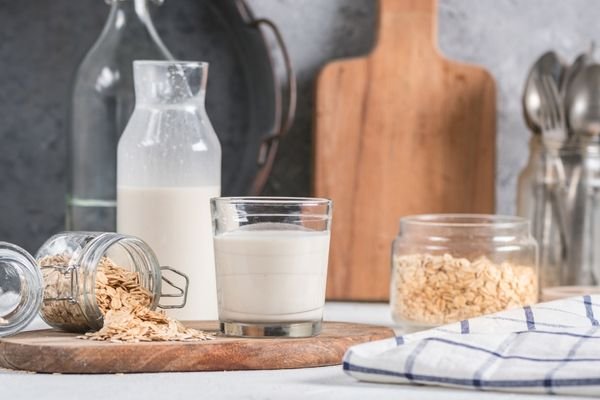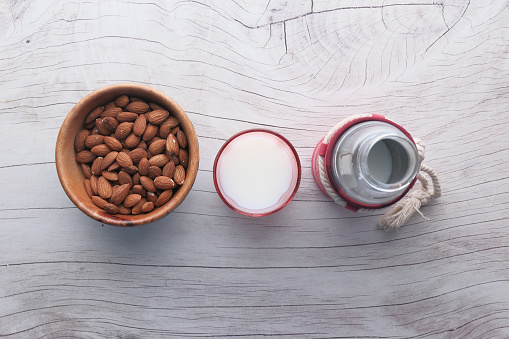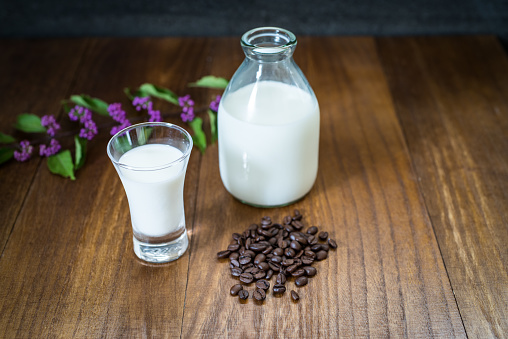
You don’t need to be a barista to make the perfect cup of coffee, but knowing what types of milk will enhance your freshly-brewed java can be essential. And if you’re looking for something new and exciting, consider alternative milk over traditional cow’s milk. From oat to almond kinds of milk, these plant-based options are full of unique flavors and textures that sort perfectly with many different kinds of coffees. Whether you prefer their cup black or every bit as sweetened up as a cappuccino, read on and discover how seemingly simple swaps in your brewin’ repertoire can flavorfully elevate each sip.
Concept of alternative kinds of milk:

Alternative pints of milk, such as oat, almond, and other plant-based varieties, are an increasingly popular choice for coffee drinkers. They can provide a unique flavor profile and texture to your beverage while offering some nutritional benefits. Many alternative bowls contain fewer calories than cow’s milk and added vitamins and minerals like calcium and potassium. Additionally, these options are often lactose-free or vegan-friendly, making them accessible for individuals who may need to avoid dairy products due to allergies or dietary restrictions.
How are they used in coffee brewing?

When using alternative kinds of milk in coffee brewing, you must know that you may need to adjust your recipe. for example,
- Oat milk has a creamy texture but can require more heat than cow’s milk when steaming.
- Almond milk produces more foam than other bowls and should be added after the espresso shot has already been pulled.
- Soy milk can often impart a sweet flavor profile, so it’s best used for cappuccinos or lattes where additional sugar is desired.
Ultimately, experimentation is critical, and trying out different bowls of milk will help you determine which ones work best with your particular coffee brew style.
Types of alternative bowls of milk available:

Oat milk:
Oat milk is one of the most popular alternative bowls because of its creamy texture and subtly sweet taste. It’s made by soaking oats in water, then blending them with additional ingredients such as oil and salt. Oat milk has a similar color to cow’s milk but will not curdle when added to hot beverages like coffee beverages.
Almond Milk:
Almond milk is created from ground almonds combined with water. It’s low-calorie, lactose-free, and contains no cholesterol or saturated fat. Its light sweetness makes it great for cappuccinos or lattes where additional sugar is desired.
Soy Milk:
Soy milk is derived from either soybeans or soy protein isolate and is naturally a good source of protein. It has a distinct, nutty flavor that can be enhanced with sweeteners or spices. Soy milk also produces more foam than other bowls, making it perfect for cappuccinos or lattes.
Hemp Milk:
Hemp milk is created from ground hemp seeds combined with water. It has a light nutty flavor and is high in protein, fiber, and essential fatty acids. Hemp milk also froths nicely, so it’s ideal for lattes or cappuccinos.
No matter which type of alternative milk you choose, understanding the unique characteristics of each one can help make your coffee brewing experience even more enjoyable. As with any ingredient, experimentation is critical – so don’t be afraid to try something new! With the right combination of bowls of milk, flavors, and textures, you can create a custom cup that’s all your own.
How each type of milk affects flavor when used for coffee shop brewing?
Each type of alternative milk has its unique flavor profile that can affect the overall taste of a beverage. Oat milk is subtly sweet, while almond and soy bowls have a nutty flavor. Coconut milk tends to be creamy, rich, and slightly sweet, while hemp milk has a light nutty profile.
Potential health benefits associated with using certain types of alternative milks in coffee brewing:
Alternative milks in coffee can offer various potential health benefits, depending on the type. For example,
- Oat milk is high in fiber and protein
- Almond milk and Soy milk are lactose-free and vegan-friendly.
- Hemp milk is also high in essential fatty acids that can help support heart health.
Incorporating alternative bowls of milk into your coffee routine can easily add nutrition to your daily cup.
Tips on selecting the correct type of alternative milk for your desired flavor profile:
When selecting alternative non-dairy milk, it’s essential to consider the flavor profile of your coffee. For example,
- if you like a creamy latte, oat or almond milk would be great choices.
- If you prefer a nutty flavor, soy or hemp milk may be better suited.
By considering these factors when selecting alternative of milks for your coffee brewing, you’ll be able to create unique cups tailored to your individual preferences!
Conclusion:
Whether you’re looking for an option that’s dairy free or wants to try something new, there are many other alternative milks in coffee brewing. Understanding how each type affects flavor and its potential health benefits can help you make an informed decision when selecting the right option for your desired flavor profile. With some experimentation and creativity, you’ll be able to craft unique cups that are sure to please!
Frequently Asked Questions (FAQs):
How can I use alternative milks in coffee brewing?
Alternative milk can be substituted for cow’s milk in any coffee drink or used to create a flavorful cup. Experimentation is key – try different alternative of dairy-free milk to find the one that best suits your taste!
What are the potential health benefits of using alternative milk in coffee brewing?
Depending on the type, alternative kinds of plant-based milk alternatives can provide a variety of vitamins and minerals such as iron, magnesium, fiber, and essential fatty acids. They can also be lactose-free and vegan-friendly.
Are there any tips for selecting the correct alternative milk type for my desired flavor profile?
Yes! Consider the flavor profile of your coffee when selecting alternative milk – for a creamy latte, oat or almond milk may be better suited, while soy or rice milk can add a nutty flavor. Coconut milk can add sweetness and richness to cappuccinos and macchiatos.
What’s the best way to incorporate alternative kinds of milk into my coffee routine?
Try experimenting with different types of glasses of milk to find the one that suits your taste the most. Incorporating alternative milk into your daily cup is an easy way to add nutrition and create unique flavors tailored to your preferences!
- Savor The Flavor: Discovering The Benefits Of Alternative Milks In Coffee Brewing - February 14, 2023
- The Science Behind Coffee Extraction - February 9, 2023
- Is black coffee zero calories? - February 6, 2023